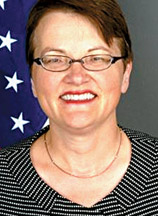|
Opinion:
Understanding American psyche towards Sri Lanka:
War crimes or violation of Intl. Humanitarian Law?
by Daya GAMAGE
 |
 |
 |
| Michele J. Sisson |
Patricia Butenis |
Samantha Power |
In response to the US ambassador-designate to Sri Lanka Michele J.
Sisson's submission before the confirmation testimony of the Senate
Foreign Relations Committee on June 6 focusing on "serious allegations
of violations of human rights law and international humanitarian law at
the end of the war remain to be investigated", Sri Lanka's foreign
secretary Karunatillake Amunugama, obviously under the behest of the
government, took offence to some of her remarks.
Exactly three years ago when the incumbent American ambassador
Patricia Butenis made even a more serious statement when she went before
the same committee for her confirmation hearing the Sri Lanka government
took no note of it.
In her Senate confirmation hearing before the Foreign Relations
Committee on 16 June in 2009 then ambassador-designate to Sri Lanka
Patricia Butenis did not conceal her objectives, targets and passions
when she declared that "the Sri Lankan government must seriously address
previous human rights abuses, including establishing accountability and
rule of law by bringing to justice those responsible for extrajudicial
killings, disappearances, and the numerous attacks against press freedom
that have occurred in the last several years."
At that time, this writer now suspects, and many others be well do
now, the GSL did not know or understand the psyche of the state
department or had no wisdom to visualize the rough 'agenda' or 'design'
which was carefully in the making, the time period immediately after the
military defeat of the once politically, diplomatically and militarily
well equipped separatist movement, Tamil Tigers which was indestructible
according to the 'super intelligence and understanding' of the State
department.
What the 15 January 2010 confidential diplomatic cable that was
dispatched from the Colombo American Embassy under Ambassador Patricia
Butenis' signature to Washington read in one paragraph on the issue of
accountability was: "There are no examples we (Americans) know of a
regime undertaking wholesale investigations of its own troops or senior
officials for war crimes while that regime or government remained in
power."
The reasonably well developed mind-set of the United States
Department of State very clearly reflected in the above 'top secret'
message to Washington, but manifested even well as to who were
responsible for the 'war crimes' in the adjoining paragraph written by
Ambassador Patricia Butenis: "In Sri Lanka this is further complicated
by the fact that responsibility for many alleged crimes rests with the
country's senior civilian and military leadership, including President
Rajapaksa and his brothers and opposition candidate General Fonseka.
The Sri Lanka media last week said: (Quote) "The government has
cautioned the United States' Ambassador Designated to Sri Lanka, Michele
Sisson, regarding her opinion on the situation in the country.
Karunatilaka Amunugama, Secretary to the Ministry of External
Affairs, explained that the ministry was aware of her recent comments
but would not be taking any action at this point in time.
He did add however, "If she is appointed as ambassador to Sri Lanka,
and she continues to make such preconceived comments then the government
will look at taking further action."
Amunugama went on to say that at this point in time the government
was only concerned about comments from the US State Department, and not
an individual."I am confident that the ideas expressed by the ambassador
designate and the US government are two different ideas," he said.(End
Quote)
The Asian Tribune gave extensive coverage to her confirmation hearing
which took place June 6 including the 'Sinhalese Won' statement made by
Senator Casey who chaired the foreign relations committee.
In the 14 December 2009 diplomatic cable (this is seven months since
the defeat of the Tamil Tigers and halfway through the development of
the 'design' or 'agenda') Assistant Secretary Blake's sentiments were
reflected in this manner:
(Quote) A/S Blake expressed both publicly and privately the need for
steps to ensure political reconciliation and accountability for abuses,
including possible crimes committed during the war. (Unquote)
The State Department Human Rights report for the year 2009 released
March 2010 made the following statement: (Quote) During the SLA
offensive against the LTTE, several hundred thousand ethnic Tamil
civilians were trapped in LTTE-held land. As the conflict reached its
final months, the government declared two no-fire zones, areas into
which it would not fire weapons. As the conflict progressed, the LTTE
and civilians under its control were confined to an increasingly small
area.
Artillery shelling, mortar fire, and aerial bombing reportedly killed
many civilians during the final five months of conflict. While only the
Sri Lankan Air Force used aerial bombs, it was difficult to attribute
artillery and mortar fire to one side or the other.
There were frequent reports of the LTTE positioning artillery and
mortar positions close to and among civilian encampments, hospitals, and
churches, drawing return fire from the government. Some reports
estimated that fighting in the last week of the conflict may have killed
1,000 civilians per day. (End Quote)
Civilian casualties
The Office of Global Criminal Justice of the U.S. State Department,
in its 04 April 2012 report on 'measures taken by the Government of Sri
Lanka to investigate and hold accountable violators of international
humanitarian and human rights law', dealing extensively on civilian
casualties during final months (Jan-May 2009) of the battle does not
fully believe the interpretation given by the LLRC report that the GSL
took efforts to safeguard civilians.
Throughout the report the State Department's emphasis was the
civilian casualties mostly caused by Sri Lanka's military while
combating the separatist LTTE and whether the GSL took adequate measures
for accountability and transparency of the final stages of the battle.
The report declares "The LLRC's recommendations fall short of fully
acknowledging all credible allegations of intentional attacks on
civilians by the GSL and LTTE. The LLRC report does not call for
investigations into allegations of deliberate attacks on civilians in
the Vanni other than the three instances briefly discussed in the
report."
The State Department says in this report, despite the GSL military
forces had advanced technical knowhow to separate the civilians and the
LTTE fighting cadre it deliberately attacked the civilians.
This determination was made having Article 48 Additional Protocol 1
in mind which provides that in order to ensure respect for and
protection of the civilian population and civilian objects, the Parties
to the conflict shall at all times distinguish between the civilian
population and combatants and between civilian objects and military
objectives and accordingly shall direct their operations only against
military objectives.
The just released Human Rights report for the year 2010 states "Many
international and national observers stated that the LLRC did not
adequately address accountability for alleged war crimes committed by
the government and the LTTE during the final months of the conflict."
It further states "They noted that the LLRC report found no
systematic government wrongdoing on issues such as the "white flag"
incident of the alleged killing of surrendering LTTE fighters, extensive
shelling of No Fire Zones, systematic shelling of hospitals, and the
withholding of humanitarian supplies from civilians entrapped by the
LTTE."
Abuses
And then it states "The government prosecuted a small number of
security force personnel who allegedly committed human rights abuses,
but it generally did not seek to identify the great majority of those
responsible for such abuses or bring them to justice. Case law generally
failed to uphold the doctrine of command responsibility for human rights
abuses."
The writers of the report editorialize "Evidence of serious
violations of international humanitarian law and international human
rights law in the final stages of the war continued to mount, but the
government refused to acknowledge credible allegations that members of
the armed forces were involved in such incidents."
International Investigation
The most vital observation the Office of Global Criminal Justice of
the U.S. State Department in its 04 April 2012 is when it declared:
"There are a variety of ways in which a government may undertake
effective investigations and other accountability processes. While some
international law conventions call for criminalization of certain human
rights violations and serious violations of IHL, other routine
administrative and special investigative processes, such as commissions
of inquiry (COI), can play an important role in establishing a factual
record of events. Although COIs and other investigative bodies are often
implemented at the national level, in some instances governments seek
international participation to bring specialized expertise into, and
help foster public confidence in, so-called "hybrid"
investigations."This warns:
"Fully internationalized processes undertaken without the relevant
government's consent have generally been pursued by the international
community only when the State concerned lacks the capacity, political
will, or both, to undertake an independent, credible, and effective
inquiry.
In the case of serious violations of IHL and human rights, including
the type of atrocities alleged to have occurred in the final months of
the conflict in Sri Lanka, however, such commissions do not obviate the
need for criminal investigation and, if appropriate, prosecutions."
The United States expresses its skepticism whether a (domestic)
commission of inquiry (COI) is capable of undertaking such a task in
expressing "Whether domestic, international, or hybrid, investigative
processes should operate consistent with best practices derived from
extensive experience in order to be both credible and effective.
There are several key criteria for evaluating the adequacy of a COI,
including: independence and competence; adequate mandate and authority;
witness and COI protection; adequate resources; a public report; and a
timely and transparent government response."
Thus it justifies an international investigation if the GSL fails to
undertake effective investigations and accountability process clearing a
path for the international community to intervene whether Sri Lanka
violated international humanitarian law (IHL) and international human
rights law (IHRL).
War Crimes
This is how the State Department very steadily developed its policy
toward Sri Lanka to project that the nation's administration was
responsible for war crimes. Its officials alternately use 'violation of
international humanitarian law (IHL) and/or international human rights
law (IHRL) and/or war crimes' in their documents - classified or not -
or in official statements.
It doesn't matter whether these officials in their documents or
pronouncements use the term 'violation of the IHL and IHRL' because in
international documents, these state department officials are fully
aware that it means none other than 'war crimes'.
"International humanitarian law sets out detailed rules aimed at
protecting the victims of armed conflict and restricting the means and
methods of warfare. It also establishes mechanisms to ensure that these
rules are respected. In particular, humanitarian law holds individuals
responsible for violations of humanitarian law which they commit, or
order others to commit. It requires that those responsible for serious
violations should be prosecuted and punished as criminals.
The most serious violations of humanitarian law are termed war
crimes" says one International Committee of Red Cross (ICRC) document.
This document further states "international humanitarian law. They
are specific acts listed in the Geneva Conventions and Protocol I,
including willful killing, torture or inhuman treatment, and wilfully
causing great injury".
ICRC document
Grave breaches specified in the four 1949 Geneva Conventions (Art.
50, 51, 130, 147 respectively) includes willful killing.
This ICRC document notes the International humanitarian law requires
State to take the following specific action in relation to grave
breaches: First, a State must enact nationallegislation prohibiting and
punishing grave breaches either adopting a separate law or by amending
existing laws. Second, a State must search for and prosecute those
alleged to be responsible for grave breaches.
When state department officials in their documents or pronouncements
use the term IHL and they are very clear the message conveying using the
determinations of internally-accepted documents.
Dr. G. Werle and Dr. J. Bung of Berlin's Humboldt-Universitat in
their War Crimes-2010 Summer Semester Paper declare: A war crime is a
violation of a rule of international humanitarian law that creates
direct criminal responsibility under international law. The law of war
crimes extends not only to international armed conflict, but to
non-international armed conflicts as well.
They say the primary purpose of the law of Geneva is to protect
persons not or no longer taking part in hostilities.
Conclusion
As much as it was clear the U.S. Department of State quite rightly
declared the LTTE as a foreign terrorist organization (FTO) and wanted a
severe control of this separatist movement blocking material support to
it to prevent the movement's ability to unleash terror tactics and
brutality in Sri Lanka, to those who have closely observed the policy
development of the United States toward Sri Lanka's 'national question'
and especially those who worked with department officials like this
writer it was equally apparent that the U.S. never wanted the Tamil
Tigers totally annihilated.
The reason was that the U.S. at all times believed the GSL was
controlled by the majority Sinhalese ethnic group and that chauvinistic
Sinhalese elements' has had influential position to affect government
policies, and that the minority Tamils were marginalized in areas of
governance and public policies.
Therefore, the state department wanted to defeat the LTTE short of
total annihilation to maintain it as a pressure group to effect changes
in the body politic and governance of the country toward reconciliation.
The foreign service officials (FSOs) stationed in Colombo since the
eighties have been developing policy planks for the state department on
those lines and had been advocating more space for the Tamil minority in
the country to reduce or eliminate the 'Sinhalese dominance' .
Failed in their attempt to salvage the LTTE, which the state
department officials largely believed was representing the 'aspirations
of the Tamil people', since the demise of the LTTE and the 'victory' of
the GSL in May 2009 it developed the policy of bringing pressure on the
GSL in areas of 'transparency - accountability - reconciliation' . This
package includes 'violation of the IHL and IHRL'.
In short, the U.S. State Department, and now joined by Dr. Samantha
Power's Atrocity Office in the White House, as documented in this
political note, steadily developed an atmosphere that the GSL during the
final months of the conflict in fact committed 'war crimes'When
ambassador-designate Michele J. Sisson is committed to have human rights
on top of her agenda that is what it means. If any official of the state
department refers to IHL and IHRL they are undoubtedly referring to war
crimes.
In fact, the incumbent American ambassador Patricia Butenis was clear
when she remarked - and serious remark as it looked - in a diplomatic
cable the state department never expected to be in the public domain
"There are no examples we know of a regime undertaking wholesale
investigations of its own troops or senior officials for war crimes
while that regime or government remained in power.
In Sri Lanka this is further complicated by the fact that
responsibility for many alleged crimes rests with the country's senior
civilian and military leadership, including President Rajapaksa and his
brothers and opposition candidate General Fonseka."
Understanding the psyche of U.S. State Department and its officials
in Washington and Colombo through their pronouncements and written
documents is not very difficult when one very carefully scrutinize their
diplomatic behaviour, reach, insinuations and aspersions along with the
careful study of host of documents that are attributed to the officials
and the department in Washington.
But it is very much easier for anyone to comprehend with little
effort who worked very closely with them who had critical access to
their classified thinking and behaviour even at a time the WikiLeaks
released documents give only a glimpse of it.
Courtesy: Asian Tribune
|

